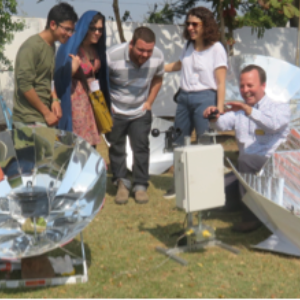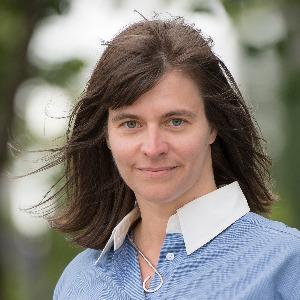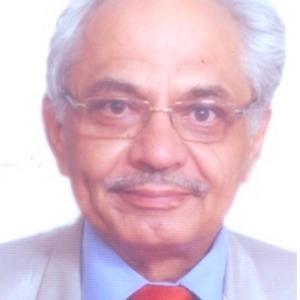
Scaling the Capacity for Testing and Reporting Solar Cooker Performance by CT/Dr. Alan Bigelow
 Betsy Agar Aug 20, 2017 12:17 | I like the scope of this project and see great potential to scale up. In doing so, how will you use the testing data to convince people of the solar cooker effectiveness? Or is it to make sure that the cookers will work as expected, before investing in certain areas? The statement, "100% of those women now recommend solar cooking," holds the key to the success of the major cultural shift demanded by radical innovations like solar cookers, are there aspects of this project that can capitalize on the personal support that women like those first 100 could offer? A model I am thinking of comes out of Brazil, where Greenpeace trained marginalized youth to install rooftop solar on schools and then traveled around the country as ambassadors to train others.
|
 Cynthia Teague Aug 21, 2017 07:15 | Proposal contributor Hi, Betsy, Thanks so much for your thumbs up! Testing data will be provided via SCI’s strong partner network to solar cooking leaders. SCI runs an association where vested stakeholders exchange ideas. SCI runs webinars, convenes leaders and is a trusted source of information for the solar cooking community. We are looking for investors to invest in the Performance Evaluation Process to build consumer confidence in products available on the open market. SCI is already capitalizing on its success with the women in Tanzania. We will be flying our trainer form Tanzania to a solar cooker manufacturer in Uganda and completing another pilot with 60 new women. We know that training and follow up is essential to long-term success. SCI's approach is to use organizations located in the particular area because they know the customs and speak the language. We also have a program to educate school-age children through SMUD, our nonprofit utility district. The SCI website appears on their web page.
|
 Manohar Lal Baharani Aug 31, 2017 01:31 | The proposal is praiseworthy. The testing protocol shall contribute in ensuring the qualitative aspects of solar cookers. Whereas reporting performance is aimed at enhancing the usage of solar cookers. Addressing the following is recommended for enrichment of the proposal: 1. How the testing protocol can contribute / enhance assembly of solar devices locally. 2. What are the methodologies for capacity building of user groups including maintanance aspects of solar devices in very simple terms understandable by the local communities.. 3. The other fuel savings is fine. However what is to done with "crop waste" that was otherwise being utilised. 4. The GHG impact projections upto 2050 could be filled up based on the average growth scenario. 5. Solar devices have a variable energy availability during the year. How the user group can understand and adjust to their cooking habits. Thanks,Best Wishes, Manohar |
 Michal Monit Sep 4, 2017 05:28 | Dear Cynthia, |
 Loretta Pehanich Sep 6, 2017 12:50 | Proposal contributor Dear Manohar, Thank you for your compliments. We agree that this is really going to contribute to moving the needle for solar cooking adoption.
The testing protocol is important for assembling solar cookers locally because the standards will help local individuals select the appropriate type of cooker for their specific needs, e.g. diet, location. Again, thank you for your kind feedback. Regards, Loretta
Knowledge dissemination is critical to large scale behavior change. SCI will use its worldwide network of 500 partners in 135 countries to share PEP results.
Multi-attribute tests consider real-time atmospheric parameters, such as incident solar radiation, wind speed, temperatures inside and outside solar cookers, and sun angles, along with other parameters, such as latitude and seasons. Until now, no neutral, brand-agnostic, international organization has had the capacity to conduct a study at this scale. SCI is filling a gap by providing reliable data.
At present, the public is unaware of how easy it is to use solar thermal energy for cooking. PEP will give consumers reliable evaluations so they can successfully implement solar cooking. SCI intends to give products a rating so that users will know solar cookers do what their manufacturers claim. SCI is learning about improved efficiencies for solar cookers already tested. Innovators will learn from the data (SCI will make PEP results public) and offer new designs. When solar cooks are successful, critical behavior change will occur and more people will stop using unsustainable energy sources.
SCI will partner with existing testing centers to leverage PEP's effectiveness to boost the entire solar cooking sector and accelerate the conversion process to the use of solar for cooking. Using solar can increase cereal crop productivity by 20 billion tons per year! Yes, soils are depleted when animal wastes are removed and used to build fires. Replacing dung as a cooking fuel will increase cereal crop productivity by 20 billion tons per year in Africa, Asia, and the Middle East.
The ASAE testing protocol for evaluating solar cookers provides a single measure of performance: the standard cooking power, Ps(50), expressed in Watts, at cooking temperature 50 ºC above ambient temperature. Cooking power is calculated from measured values of incident solar radiation and measurements of temperature change in an amount of water proportional to a cooker’s intercept area (7000 g/m2). Results are normalized using incident solar radiation, allowing comparable results independent of testing date and location.
|
 Loretta Pehanich Sep 6, 2017 12:58 | Proposal contributor Dear Michal, We are crossing our fingers, too! I love your idea about partnering with CSRs, and we are just starting down that road. This is big. We know many will want to move this important initiative forward. And yes! We are way ahead of you on sharing information! That’s what SCI is all about We already are offering the PEP open source. AND we are offering free access to an important webinar featuring Dr. Alan Bigelow on the website, too. Visit http://www.solarcookers.org/PEP to see it. And enjoy reading all the other details on the PEP page on SCI’s website. We appreciate your input. Let me know what you think. Loretta and Cynthia |
 Loretta Pehanich Sep 6, 2017 12:58 | Proposal contributor Dear Michal, We are crossing our fingers, too! I love your idea about partnering with CSRs, and we are just starting down that road. This is big. We know many will want to move this important initiative forward. And yes! We are way ahead of you on sharing information! That’s what SCI is all about We already are offering the PEP open source. AND we are offering free access to an important webinar featuring Dr. Alan Bigelow on the website, too. Visit http://www.solarcookers.org/PEP to see it. And enjoy reading all the other details on the PEP page on SCI’s website. We appreciate your input. Let me know what you think. Loretta and Cynthia |
 Cynthia Teague Sep 7, 2017 01:29 | Proposal contributor Betsy, In talking with Dr. Bigelow, he thanked you and suggested the following in addition to the first comments I sent you. PEP results might also be useful for "convincing people of solar cooker effectiveness" because water-heating profiles are a part of the raw data. We believe all potential users can appreciate the time to heat a certain amount of water, which again is part of the raw data, which will be posted on the SCI PEP results page. Thank you. Cynthia and Dr. Bigelow |
 Cynthia Teague Sep 7, 2017 02:27 | Proposal contributor Manohar -- Additional responses from Dr. Bigelow regarding the questions you put forth came today and I wanted to share these with you. 1. SCI: Regional solar cooking testing facilities can benefit local assembly of solar cookers by evaluating the power (in Watts) of the solar cooker. This single measure of thermal performance can guide a designer to establish optimal functionality of their solar cooker. For local assembly of a commercial design, local SCI PEP results can serve as a measure of quality control for the assembly plant. 2. Regarding maintenance issue and capacity of user groups in local communities. SCI: Solar cooker manufacturers often include tips and guidance for maintenance in the instruction manual, sometimes using local languages or even pictographs for clarity. Given the variety of solar cooker products, it is important to consider the maintenance guidance for a specific product. 3. Regarding crop waste, we suggest other productive uses such as returning it to the soil and using it for biogas production, and composting, which are all good solutions. It can also be used for cooking as a backup, when sunlight is not available for cooking. Your final question regarding variable energy availability prompted the following response from Dr. Bigelow: SCI: Yes, solar energy is not constant and one needs to learn how to take advantage of it when it is freely available, which exemplifies the importance of training. Interestingly, many user groups are already using free solar energy for drying food items and other household items, such as clothing. This initial foothold on using free solar energy can benefit the learning curve for understanding and adjusting cooking habits when learning how to solar cook. Thank you again and best wishes to you Manohar.
|
 Manohar Lal Baharani Oct 27, 2017 04:09 | Dear Loretta, Dear Cynthia Dear Dr. Bigelow Greatly appreciate the point wise responses to my comments. I am happy that the proposal has reached semi-finalist stage. The vision of proposal is praiseworthy as it foresees replacing three billion customers using biomass combustion stoves for cooking. These three billion living in countries having abundant solar resources and fuel challenged as well offers many challenges as well. I would like to get enlightened on your views on the following as well: 1. A number of countries are having program of activities for promoting fuel efficient biomass cook stoves since last over a decade. How do you think the testing protocols for solar cookers will improve its chances for switch over including in terms of financial cost benefits analysis taking into account the high fixed cost / low operating costs of solar cookers versus low fixed costs / locally available fuel for traditional cook stoves. Another aspect is varying degree of buying power of local currencies. 2. How SCI can influence / convince the organisations like Green Climate Fund, World Bank, Asian Development Banks and more to promote for the tested solar cookers to have easy access to micro finance / funding support avenues in relation with amount of green house gas reductions through this change over from biomass cook stoves by the program of activities in various countries across the globe. Wish you good luck for success as finalist... Best Wishes, Manohar
|
 Manohar Lal Baharani Oct 27, 2017 04:10 | Dear Loretta, Dear Cynthia Dear Dr. Bigelow Greatly appreciate the point wise responses to my comments. I am happy that the proposal has reached semi-finalist stage. The vision of proposal is praiseworthy as it foresees replacing three billion customers using biomass combustion stoves for cooking. These three billion living in countries having abundant solar resources and fuel challenged as well offers many challenges as well. I would like to get enlightened on your views on the following as well: 1. A number of countries are having program of activities for promoting fuel efficient biomass cook stoves since last over a decade. How do you think the testing protocols for solar cookers will improve its chances for switch over including in terms of financial cost benefits analysis taking into account the high fixed cost / low operating costs of solar cookers versus low fixed costs / locally available fuel for traditional cook stoves. Another aspect is varying degree of buying power of local currencies. 2. How SCI can influence / convince the organisations like Green Climate Fund, World Bank, Asian Development Banks and more to promote for the tested solar cookers to have easy access to micro finance / funding support avenues in relation with amount of green house gas reductions through this change over from biomass cook stoves by the program of activities in various countries across the globe. Wish you good luck for success as finalist... Best Wishes, Manohar
|
 Loretta Pehanich Oct 30, 2017 05:15 | Proposal contributor Dear Manohar, Sorry for the delay in replying. Dr. Alan Bigelow is currently at the Clean Cooking Forum in Delhi, and I have been having trouble with internet access. Dr. Bigelow is actively sharing information in several key venues, traveling for one month to a series of meetings to continue advocacy for solar cooking:
Your questions are excellent ones. Let me pull another voice into this conversation and get back to you. Loretta Pehanich
|
 Loretta Pehanich Oct 30, 2017 07:18 | Proposal contributor Executive Director Julie Greene had this to add: Dear Manohar, Your questions demonstrate the perfect grasp of the impact the PEP will have. You are focusing on key points that inspired SCI’s creation of this important protocol.
While there is an internationally accepted standard for solar cooker evaluation (ASAE.580.1), it has not been developed into a process that can be implemented on a global scale, at reasonable cost, until the PEP. SCI’s Dr. Bigelow is participating in the International Organization of Standardization’s (ISO) TC 285 in Kathmandu this week as the international standard for cookstoves—which is poised to include solar cookers in the standard--draws to its conclusion. The preliminary PEP results have attracted the attention of the process participants because they provide normalized results for evaluating solar cookers. The PEP empowers designers to innovate for their local context. Because the PEP process provides real-time feedback on technology performance, the design process can evaluate multiple prototypes to improve the design saving resources that would be wasted on producing and marketing an inefficient design. It also supports local innovators as they design for their unique context. The testing protocol, combined with the baseline data SCI has gathered demonstrating fuel savings and cost savings, assist decision-makers as they evaluate the high fixed cost/low operating cost scenario you describe. Pictures of SCI's portable testing station, as well as open-source plans, and a webinar providing more detail is available at http://www.solarcookers.org/our-work/performance-evaluation-process/ and SCI is eager to engage more partners in this work. 2. Solar Cookers International has strategic advocacy planned to advocate for inclusion of solar cooking in the Nationally determined contributions (NDCs) that are at the heart of the Paris Agreement and outline the plans to achieve national climate goals. At the UNFCC COP23 event in Bonn, Germany next week, and at the High-Level Political Forum events at United Nations, New York, U.S., SCI will provide language and rationale for including solar cooking in the NDCs and VNRs. Including solar cooking as a clean, sustainable cooking solution in national plan documents provide a structure and rationale for funding for solar cooking by the Green Climate Fund, World Bank, and other finance support avenues. Thank you very much for your consideration. |
 Mark Kriss Dec 28, 2017 08:00 | Solar Cooker International (SCI) is a cost-effective impact multiplier with a proven track record. This is an awesome proposal and is worthy of everyone's support at Climate CoLab. |
 Coca Mary May 26, 2020 04:07 | Thanks for the information your post brings. I see the novelty in your text, I will share it for everyone to read. I look forward to reading more articles from you. |